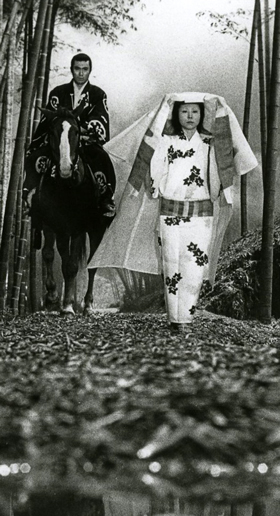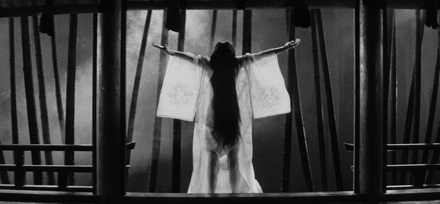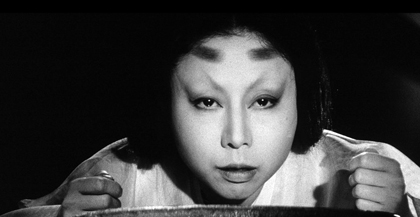
 |
|
|
|
Although Japanese horror filmmaking was becoming more westernized in the late 1960s, indigenous ghost tales were still very popular. Masaki Kobayashi's omnibus horror epic Kwaidan received wide distribution in the West, as did director Kaneto Shindo's frightening Onibaba. That tale of a cruel supernatural revenge featured a savage demon mask that haunted many a nightmare. Four years later Shindo returned with Kuroneko (Yabu no naka no kuroneko), a stunningly artful horror spectacle from an even older folk tradition, the "ghost cat" tale. Shindo's wife and frequent collaborator Nobuko Otowa stars opposite Kichiemon Nakamura, a famous Kabuki performer. Kuroneko at times resembles a 'dance of the dead' ballet film. Its intensely formal beauties share screen space with gruesome murders and sudden spectral manifestations. 
Kuroneko begins much like Onibaba. Farmer Hachi (Kichiemon Nakamura) has been conscripted to fight in the civil wars. With the man of the house gone, farmwomen Yone and Shige (Nobuko Otowa & Kiwako Taichi) fall victim to rapacious marauding samurai. Their bodies are examines by the black house cat. Three years later Hachi returns to learn that his mother and wife disappeared when the house burned. Promoted for his valor in combat, Hachi is now known as Gintoki of the Grove and serves as a lieutenant-retainer of the samurai chief Raiko Minamoto (Kei Sato). Various samurai, their throats savagely torn, have been found in town, in the fields and at the site of Gintoki's former farm. Ordered to destroy the phantoms presumed responsible, Gintoki discovers that they are none other than his beloved mother and wife. The ghostly women have made an unholy bargain to avenge themselves, and are intent on seducing and murdering every samurai in the world. Shige keeps her ghostly vow to never divulge her pact, but defies the powers of darkness by spending seven nights with her husband. The demonic pact cannot be broken -- Gintoki's own mother will turn against him. Once again Kaneto Shindo shows himself a master of the uncanny. Just as horror films were abandoning traditional forms, Kuroneko celebrates the beauty of stylized horror. Borrowing visual motifs from experimental film as well as Japanese theatrical tradition, Shindo generates chills with dream-like visions, eerie stillness and sudden eruptions of the irrational into an otherwise naturalistic environment. Self-assured samurai travelers think their luck has taken a positive turn at the Rajomon gate, where waits a demure maiden in a white dress, holding a gauzy veil over her head. She's afraid of the dark woods ahead, and seems grateful -- too grateful, perhaps -- when the samurai gallantly offers his protection. As if in a Grimm fairy tale for amorous adults, the maiden leads her knight to a secluded but elegant house. White mists rise as the maiden's mother serves saké and discreetly retires. The samurai sees an invitation in the maiden's smile, but as he lies down with her... We're immediately struck by the not-quite practical situation: the mother Yone's perfectly starched, un-creased dress is one of those traditional creations that would seem to require two handmaidens to put on. While Shige seduces an unsuspecting victim, Yone performs a bizarre set of slow dance moves in the misty entranceway. Shots revealing the supernatural at work function as oneiric cutaways, as if they are something felt or intuited, and not seen. Like a black cat crossing the next samurai's path, Shige tumbles silently through the air above her victim-to-be. A long braid of Yone's hair twitches like a cat's tail. Both women have shaved eyebrows, with substitute smudges of makeup high on their foreheads. We see Yone briefly with slightly exaggerated demon-like makeup. Even when one of Shige's arms suddenly appears covered with coarse black hair, we're not convinced that these manifestations are literal. The supernatural warps reality. 
Director Shindo gravitated to stories about the travails of the poor and the depredations of the rich. After boasting that peasants respect and admire samurai, the wealthy Raiko Minamoto (a real historical person) states openly that peasants are worthless, and can be killed without regret. Shindo's script makes both Raiko and to some extent Gintoki into hypocrites. Both started as ragged peasants and rose in status by fighting. Raiko admits that the legends of his prowess in battle are mostly tall tales. Gintoki returns with the head of a vicious enemy, Sunehiko the Bear, but does not say that he killed his foe while running for his life. The rape and murder was committed not by bandits, but by Raiko's "noble" retainers. Raiko is critical of his royal masters at court, but prefers to send Gintoki after the demons rather than risk his own neck. Gintoki finds himself in a bizarre romantic situation, making love to the ghost of his dead wife. This outrage of love breaks multiple oaths and blood pacts for which there will literally be Hell to pay. Yone continues to rip the throats of samurai, forcing Gintoki into an ultimately hopeless series of fights. At one point Yone disguises herself to recover her arm, a hairy clawed thing that Gintoki puts on display with his swords, a touch worthy of Edgar Allan Poe. If one's own mother came back from the dead, which of us would not obey her wishes? Criterion's Blu-ray of Kuroneko presents this highly unusual Japanese thriller in a handsome B&W Tohoscope transfer that brings out all the beauty of figures emerging from the fog, and long trucking shots through impenetrably thick bamboo forests. The movie is not difficult to follow while reading English subtitles. Many sequences are virtually dialogue-free. 
The soundtrack plays an active role in developing the film's uncanny atmosphere. Hikaru Hayashi's drum rhythms and eccentric musical notes merge with natural sounds, until one becomes unaware where one leaves off and the other begins. Some of the most disturbing scenes are "scored" with near- subliminal presences that seem to have their own psychological effect. Disc producer Curtis Tsui builds his extras around two interviews. The aged Kaneto Shindo is interviewed by a former assistant, in a Director's Guild of Japan piece that begins with questions about Shindo's entrance into the film industry. In a new interview, critic Tadao Sato analyzes Kuroneko from the biographical angle and outlines its high standing as a Japanese horror classic. He then sketches a fascinating overview of the classic cat ghost story, explaining the significance of the cat in the cultural context of Japanese folk tales. The original trailer emphasizes the film's erotic aspect and billboards the famous actor Kichiemon Nakamura. Criterion's insert booklet contains an informed essay by Maitland McDonagh and an excerpt from a 1972 interview with Kaneto Shindo conducted by Joan Mellen. Shindo talks about his politics, and states firmly that in Japan filmmaking is considered an art.
On a scale of Excellent, Good, Fair, and Poor,
Kuroneko Blu-ray rates:
Reviews on the Savant main site have additional credits information and are often updated and annotated with reader input and graphics. Also, don't forget the 2011 Savant Wish List. T'was Ever Thus.
Review Staff | About DVD Talk | Newsletter Subscribe | Join DVD Talk Forum |
| ||||||||||||||||||